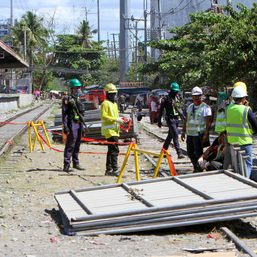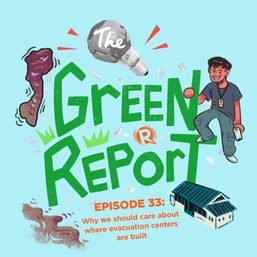SUMMARY
This is AI generated summarization, which may have errors. For context, always refer to the full article.
![[OPINION] What must the green agenda be for a Marcos Jr. presidency?](https://www.rappler.com/tachyon/2022/06/green-agenda-marcos-june-2-2022.jpg)
Less than half of Filipino voters have spoken. Now the focus should be turned to critical issues the Philippines must address. None is arguably more overlooked yet vital to national sustainable development than the green agenda.
In a previous article, I gave the green governance of President Rodrigo Duterte a grade of C. While a few milestones on climate and environmental action were achieved, much of their impact was negated by continuing problems in policy implementation, coordination among agencies, lack of sufficient funding, and priorities of top officials.
In commemoration of Philippine Environment Month, let us examine how the government during the term of Bongbong Marcos should pursue climate and environment action on the road to sustainable development.
Effective climate action
With the Philippines as one of the nations at highest risk for the climate crisis, the Marcos administration must prioritize increasing resilience to its impacts. The country incurred over P500 billion in loss and damage due to climate change impacts over the past decade, with 9 of the 10 most destructive typhoons in our history hitting during this period.
As greenhouse gas (GHG) emissions are still increasing worldwide, climate-related threats in the form of typhoons, droughts, and sea level rise are likely to worsen in the near future. To minimize loss and damage, improving capacities of local stakeholders to adapt to these impacts should be prioritized. This means that Marcos’s government must avoid centralizing powers and resources by creating the Department of Disaster Resilience, which would make preparations and responses against potential calamities more inefficient.
Among important policies is to make available funding sources more accessible to highly-vulnerable communities to better address impacts, especially the People’s Survival Fund. It should also resolve problems with local funding for disaster management remaining not fully used in many municipalities.
Adapting to climate change is important, but that should not mean the Philippines should just keep on polluting the environment. The government should establish a clear decarbonization pathway for reducing national GHG emissions by 75% within the current decade, as it voluntarily pledged under the Paris climate agreement. This includes a net-zero commitment and an established set of mitigation programs that includes the phaseout of coal, reduced reliance on other fossil fuels, and divestment from dirty energy.
Just energy transition
The just transition away from fossil fuels is more than just about reducing emissions. The Philippines has the second-highest electricity price in Asia, partly due to its reliance on coal to provide half of its power generation. Oil prices keep on increasing at a historic pace. Most of these fuels are imported from other countries, making their local prices sensitive to trends in the market when affected by crises such as the COVID-19 pandemic and the Russia-Ukraine conflict.
These are why it is crucial to become more self-sufficient in the energy sector. The best solution is for the country to further develop its renewable energy (RE) resources, which only provides around 25% of the national energy grid. Marcos, whose home province is one of the country’s centers of RE, needs to provide leadership in steering the Philippines towards this needed energy transition. His government must have a stricter implementation of the coal moratorium to also ban all proposed coal-fired power plants and avoid increasing our reliance on natural gas, another fossil fuel that is also largely being imported.
The next president must also avoid reviving the Bataan Nuclear Power Plant, which was an infamous project of his father. Such a move would be more politically-motivated than an actual solution to national energy security. It would not only deviate resources that could instead be used for RE development, but also impose undeniable security risks and high initial costs that would burden electricity consumers, in one way or another.
Ecological justice
Three days before the elections, the Commission on Human Rights published the findings of its National Inquiry on Climate Change, which identifies that fossil fuel corporations can be sued for their GHG emissions causing the climate crisis and its impacts that trigger human rights violations. Marcos’s government must highlight the need to protect the rights of Filipinos to a healthy environment and help the most vulnerable peoples receive enough compensation for said violations.
Climate and environmental justice must also be upheld in other areas, such as protecting communities and ecosystems from pollution and destruction brought by mining activities, a sector which Marcos openly wants to support. From fisherfolk communities near the planned aerotropolis in Bulacan to indigenous peoples near the proposed Kaliwa Dam, his government must demonstrate that no one’s well-being should be compromised for the sake of infrastructure development.
Justice should be highlighted in bills to be passed under the next Congress. Among the bills that should be at the top of its agenda include phasing out single-use plastics and sustainable forest management; the latter would help protect the country’s forests, lead to more reforestation, and provide benefits for indigenous peoples and other stakeholders. Turning the House resolution declaring a climate emergency in the Philippines into a law to further accelerate climate action should also be prioritized.
The climate and environmental crisis impacts peoples regardless of politics, yet advancing solutions is influenced by it. Whether he admits it or not, Marcos has a lot to prove when providing the effective leadership in green governance, and overall governance that the Philippines needs. Never forget that in contrast to presidential debates, there is no avoiding this challenge. Never again should anyone be left behind in the pursuit of ecologically-sound, climate-resilient sustainable development. – Rappler.com
John Leo Algo is the Deputy Executive Director of Programs and Campaigns of Living Laudato Si’ Philippines and a member of the interim Secretariat of Aksyon Klima Pilipinas. He has been representing Philippine civil society in regional and global UN conferences on climate and the environment since 2017. He has been a climate and environmental journalist since 2016.
Add a comment
How does this make you feel?
![[OPINION] Why a Department of Disaster Resilience should not be created](https://www.rappler.com/tachyon/2020/11/imho-ddr.jpg?fit=449%2C449)
![[OPINION] Activate BNPP? You could increase childhood cancers in Bataan and beyond](https://www.rappler.com/tachyon/2022/04/Screen-Shot-2022-04-07-at-1.09.24-PM.png?fit=449%2C449)

![[OPINION] Fossil fuel debts are illegitimate and must be canceled](https://www.rappler.com/tachyon/2024/04/IMHO-fossil-fuel-debt-cancelled-April-16-2024.jpg?resize=257%2C257&crop_strategy=attention)
![[WATCH] John Kerry: You can’t solve climate crisis without addressing ocean’s challenges](https://www.rappler.com/tachyon/2023/12/cop28-united-states-john-kerry-december-2-2023-reuters-001.jpg?resize=257%2C257&crop_strategy=attention)


There are no comments yet. Add your comment to start the conversation.